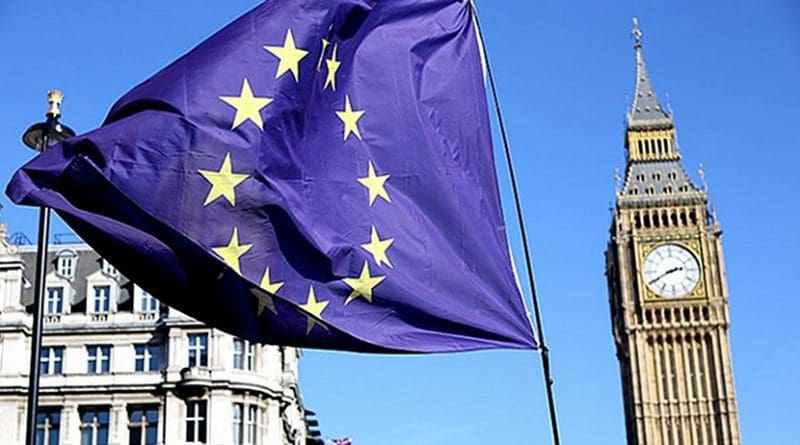UK Faces A Rocky Road Ahead After Brexit – OpEd
By Arab News
By Andrew Hammond*
The UK has begun what it asserts will be the country’s most sweeping defense and security review since the end of the Cold War. But while Prime Minister Boris Johnson is eager to explore the potential opportunities of the post-Brexit landscape, the challenges are mounting too.
Two of the longstanding pillars of UK policy since the end of the Second World War, its alliances with the USand Europe, are in flux. Not only is Johnson in dispute with US President Donald Trump on issues such asHuawei and digital taxes, he also faces a massive negotiation this year with the EU to agree and ratify a new trade deal before Dec. 31.
This creates a major headache for London at a time when it must also recalibrate its foreign and defense policy in every part of the globe from Asia-Pacific to the Americas. So this latest (2020) Strategic Defense and Security Review, which will conclude in the autumn, will look at Britain’s key post-Brexit foreign goals and what this will require from the armed forces, security, diplomacy, foreign aid and intelligence communities, including in space and cyberspace. One of the themes will be that of “fusion,” the Whitehall jargon for cooperation and partnership between UK departments, services and agencies, and also with key international allies.
Five years after the last review, with the UK having left the EU, the new one is as urgent as it is necessary. In a previous generation, former Conservative foreign secretary Douglas Hurd asserted that Britain had been able to “punch above its weight” in the postwar era, despite it no longer being a great power. That may still be true today, but is under increasing scrutiny as the UK risks fading into what some have called foreign policy irrelevance.
Only last week, UK allies questioned the absence of high-ranking UK officials at the annual Munich Security Conference, one of the premier international events in the foreign and defense policy calendar. Take the example of US House of Representatives Speaker Nancy Pelosi, part of the largest ever US delegation to the event, who said: “I hope this is not an indication of UK commitment to multilaterialism.” The former Swedish Prime Minister Carl Bildt pointed out: “The one nation that is completely absent is the UK. Has ‘Global Britain’ gone introvert?”
These comments were not isolated. In fact, over much of the past decade, Britain has been losing its global influence at the fastest pace for years, despite the fact that it retains the fifth-largest defense budget, the second-largest aid budget and the fourth-largest diplomatic network internationally. And this has happened because successive governments have moved away from the world, rather than confidently embracing it.
It is a flawed approach that has weakened Britain and diminished its international standing. And this at a time when the UK faces a massive range of challenges from Russia’s stridency to a continued terrorist threat.
Post-Brexit, Johnson has asserted that he wants to rediscover the UK’s heritage “as a great global trading nation.” To this end, London is agreeing new post-Brexit UK trade deals with dozens of countries, but this process is not straight forward.
Take the example of a potential new UK-US trade deal where there may be key areas ripe for agreement, including lowering or eliminating tariffs on goods, but disagreements too. This includes likely disputes over harmonising financial services regulations, while other possible political icebergs lie on the horizon too, not least given the president’s commitment to “America First.”
Outside of trade, Johnson has re-affirmed his vision that the UK will continue to play a major role in international security, including through its membership of NATO. While he says that London will play a genuinely global role through continued membership of forums such as the UN Security Council, last week’s experience at the Munich Conference belies this, and its continued commitment to Europe will also be very important going forward too.
To be fair to Johnson, he has sought to emphasise that while the UK is departing the EU, it is not leaving Europe. And he claims that London will seek to continue, if not intensify, cooperation with EU partners in areas including crime, counter-terrorism and foreign affairs.
At this stage, the EU has not yet formally commented in great detail on wider post-Brexit security and foreign policy cooperation with the UK. However, it is likely that many national leaders, including those in Germany, France and eastern Europe, will particularly favor a continued strong working relationship given the growing array of external security challenges facing the union, presenting a window of opportunity for London to re-engage.
This underlines that, ultimately, the issue of UK foreign and defense policy is not just a burning issue for Britain, but also the rest of the world; if London no longer punches so strongly on the international stage it is also less able to bolster international security and prosperity at a time when both remain fragile.
Continuing Britain’s proud traditions as a long-standing promoter of democracy, human rights and the rule of law long into the 21st century would be best secured by a different approach to UK foreign policy that the new government should seek to enable.
- Andrew Hammond is an Associate at LSE IDEAS at the London School of Economics

